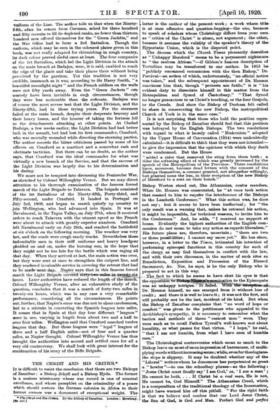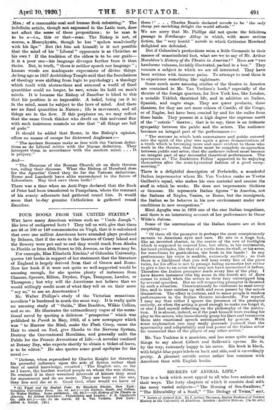THE CHRIST AND HIS CRITICS.* IT is difficult to resist
the conclusion that there are two Bishops of Zanzibar: a Bishop Jekyll and a Bishop Hyde. The former is a zealous missionary whose war record is one of unusual excellence, and whose pamphlet on the criminality of a peace which should restore the German colonies in Africa to their former owners was a document of exceptional weight. The • Ths Christ and HU crate. By the Nehopot Banaibes. London : wowbray. Os. nem
latter is the author of the present work ; a work whose title is at once offensive and question-begging—the one, because to speak of scholars whose Chriatology differs from your own as " critics of the Christ " is abuse, not argument ; the other, because it assumes the validity of the speaker's theory of the Hypostatic Union, which is the disputed point.
The diocese which the Church Times pleasantly describes as " Unhappy Hereford " seems to be a permanent nightmare to " the zealous. African "—if Gibbon's famous description of Tertullian may be transferred to our author. In 1915 he " publicly renounced communion with the then Bishop," Dr. Percival—an action of which, unfortunately, "no official notice was taken," and the subsequent appointment of Dr. Henson convinces him that, though " protests are futile," it is " his evident duty to dissociate himself in this matter from the Metropolitan and Synod of Canterbury." " That Synod no longer guarantees to us Christ's teaching, or the four Gospels, or the Creeds. And since the Bishop of Durham. felt called to share in consecrating the new Bishop, the metropolitical Church of York is in the same case."
It is not surprising that those who hold the position repre- sented by the Bishop of Zaneibar should feel that this position was betrayed by the English Bishops. The two resolutions with regard to what is loosely called " Modernism " adopted by the Upper House of Convocation. (1914) were undoubtedly calculated—it is difficult to think that they were not intended— to give the impression that the opinions with which they dealt were condemned. But the House
" added a rider that removed the sting from them both ; a rider the softening effect of which was greatly increased by the speech of the Metropolitan of the Province. These resolutions have, moreover, become dead letters with the consent of the Bishops themselves, a consent granted, not altogether willingly, but granted none the less. in their reception of the new Bishop pf Hereford to a seat on their bench."
Bishop Weston stood out, like Athanasins, contra munduon When Dr. Henson was consecrated, he " at once took action that seemed to him to require the interference of the Bishops
in the Lambeth Conference." What this action was, he does not say ; but it seems to have been ineffectual ; for "the only result was a warning that, unless he retraced his action, it might be impossible, for technical reasons, to invite him to the Conference." And, he adds, " I received no support at home. Evidently the highest authorities. of the English com- munion do not mean to take any action as regards liberalism."
His future plans are, therefore, uncertain ; there are two
or three possibilities ; I cannot say more yet." He has since, however, in a letter to the Times, intimated his intention of performing episcopal functions in this country for such of the clergy, as may find themselves in conflict with the law, and with their own diocesans, in the matter of such rites as Benediction, Exposition and Procession of the Blessed Sacrament, &c. Nor, he says, is he the only Bishop who is
prepared to act in this way.
The fact to which he seems to have shut his eyes is that the opposition to TruffievellOpprissjoaminietion to the Episcopate was an unhappy intrigue. It'faded. VitittriiteMillissepresseesafse,„,„ Dr. Henson himself, no one emerged from it without loss of credit ; and there it is well to leave it ; it was not the first, and will probably not be the last, incident of its kind. But when the Bishop of Zanzibar complains that " no word of hope or comfort " was given to the petitioners who appealed to the Archbishop's sympathy, it is necessary to remember what the tactics and methods of those " earnest men " were. They were such as to recall Father Tyrrell's well-known mot about humility, or what passes for that virtue. " I hope," he said, " that I am not humble, from what I have seen of humble men."
The Christologieal controversies which mean so much to the Bishop leave on most of uasnimpression of barrenness, of multi- plying words without inereasingsmase ; while, even for theologians.
the slope is slippery. It may be doubted whether any of the "Liberal" writerswhom he denounces has perpetrated so great
a " howler "—to use the schoolboy phrase—as the following ; "Jesus Christ must finally say ` I am God,' or, ` I am a man' ; He cannot be both. . . . If Christ be a reef man, He is not, He cannot be, God Himself." The Athanasian Creed, which is a compendium of the traditional theology of the Incarnation, might have warned him off this pitfall. " For the right faith is that we believe • and confess that our Lord Jesus Christ, the Son of God, is God and Man. Perfect God and perfect fan; of a reasonable soul and human flesh subsisting." The • indefinite article, though not expressed in the Latin text, does not affect the sense of these propositions ; to be man is to be a--i.e., this or that—man. The Bishop is not, of
course, a Monophysite, though he has " spoken unadvisedly with his lips." But (let him ask himself) is it not possible that the mind of his " Liberal " opponents is as Christian as his own ? If the tradition of the elders is to be our guide— it is a poor one—his language diverges further from it than theirs. But in truth, " there is neither speech nor language " ; human worlds am inadequate expressions of divine things. As long.ago as 1857 Archbishop Temple said that the foundations of theology were shifting from logic to psychology ; a theology which dealt with abstractions and assumed a world of fixed quantities could no longer, he -saw, retain its held on men's minds. It is because the Bishop of Zanzibar is blind to this
that his position is so impossible. A belief, being (as it is) in the mind, must be subject to the laws of mind. And there are no fixed quantities in Nature ; life is movement, and all .
things are in the flow. If this perplexes us, we may reflect that the same Greek thinker who dwelt on this universal flux with such insistence reminds us also that " all things are full of gods."
It should be added that Rome, in the Bishop's opinion, offers no ,means of escape for distressed Anglicans :— " The modern Romans -make as free with the Vatican defini- tions as do Liberal critics with the Nicene definition. They interpret them in accordance with the modern mind. . . . It is perjury."
And- " The Hensons of the Roman Church sit on their thrones too, ruling their dioceses. What the Bishop of Hereford does for the Apostles' Creed they do for the Vatican definitions. Rome and Lambeth have alike surrendered to the forces of Liberalism. May God save them both ! "
There was a time- when an Anti-Pope declared that the Rock of Peter had been transferred to Pampeluna, where the remnant
of his scanty adherents had gathered round him. It would seem that to-day genuine Catholicism is .gathered round Zanzibar.



































 Previous page
Previous page